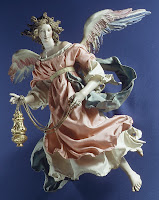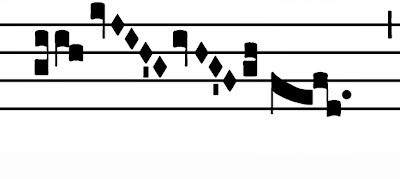Does anyone have a recording of the EF Michaelmas propers?
-
Just wondering. I had to sit down and really zero in on these, since they seem a bit out of the ordinary, although they are really beautiful. Wish there was a recording I could send to our schola, but I've googled myself silly trying to find one. Maybe Mary Ann Carr Wilson could make one for us? : )
It does seem fitting that we should have to struggle somewhat with the music for this momentous feastday. If we ever needed the protection of glorious St. Michael, it's now, although I feel like I'm climbing the Mont St. Michel with these propers. Thanked by 1expeditus1
Thanked by 1expeditus1 -
Introit, Offertory, and Communion recordings can be found at http://www.christusrex.org/www2/cantgreg/missa_ss_michaelis_grabrielis_et_raphaelis_archangelorum.html. Of course, the psalm tone Gradual and Alleluia from the Liber brevior are always a legitimate option whenever the full chants are too difficult to do well.
-
Thanks a bunch for the recordings! We're probably going to go with the Chants Abreges for the other two. The original Alleluia is quite lovely, though.
-
JulieColl, you have some fellow mountain-climbers with you on the journey. We are going to bite the bullet and do the Liber ones.Thanked by 1JulieColl
-
Thanks for the vote of confidence, Julie! We are actually only singing the Introit, Offertory, and Communion from the Liber U.
We're using the Chants abreges for the Gradual and Alleluia.
This is because we have OLR next week and plan on singing full propers, and we looked ahead at the Gradual- a doozy.
And, well, also because we had pizza in between schola and full choir rehearsals last night and kinda ran out of time after attempting the Offertory. We've never done that during Thursday rehearsal so I'm trying not to feel like a slacker.
Mont St. Michel indeed!! That's kinda exactly how it felt.Thanked by 1JulieColl -
More power to you, expeditus1! Wish I could be there to hear the Grad and Alleluia. They are extraordinary, esp. that Alleluia verse. Mary Ann, I was feeling a little guilty, too, but my husband has no such compunction. He took one look at the Gradual and Alleluia last night when I printed out the propers (we just learned yesterday that we were singing the Michaelmas propers) and promptly vetoed them.
We'll just have to put our best efforts into the Offertory which is quite compelling. I was reading Dom Johner's commentary and was blown away by the imagery from the Book of Revelations:1. An angel is standing before the altar of God when in spirit we bring our gifts to the altar to add them to the sacrificial gifts of the priest. In a mute way our gifts say, as once said St. Michael: "Who is like God!" They acknowledge God's infinite perfection and our absolute dependence upon Him. Would that we might offer our gifts with the purity and devotion of the holy angels! 2. The angel had a censer of great value. The gift we chanters bring, our compositions and their rendition, ought also to have artistic value. 3. "There was given to him much incense." Surely it would be ignoble if we were to be niggardly with God. 4. Practically at the same time that we are singing this phrase, clouds of incense are ascending at the altar during a solemn high Mass.Thus song and liturgical action are joined. The melody graphically describes how the sweet-smelling incense is wafted upward, how at the top of the canopy the clouds disperse and slowly settle, only to be borne aloft again by new clouds. From the angel's golden censer came rays of heat and the glow of fire. In a similar manner the soul of the creative or imitative artist must glow. That which proceeds from the soul must ascend upward to the presence of God, must seek to glorify Him. Only then will our chant lift the hearts of the faithful aloft to God. May the sentiment of the hymn for Terce be verified in us: Flammescat igne caritas, accendat ardor proximos—"Let love light up our mortal frame, till others catch the living flame." . . . The angel stood very near to the altar. Formerly that also was the place assigned to the singers. If in many instances they are now physically distant from the altar, they should strive the more to be very near it in spirit. -
JulieColl, that Offertory Proper has to be one of my favorites!
-
Yeah, same here. I could not find any recording of Saint Michael Mass on Youtube/Vimeo/GloriaTV so I recorded them:
http://www.gregorianbooks.com/saints.html#st_michael
(click on the buttons )
)
These propers seemed to be quite challenging at first (made a few mistakes) but once you know them you love them.
And thank you for the picture of the Mont Saint-Michel. :-) -
Jacques, this is an awesome resource! It's a technical marvel and your recordings are superb. It's so helpful having everything in one place, including the commentary and related videos. I'm going to spend alot of time here. Merci beaucoup!!
I'm floating on clouds now since I could hear the Alleluia. : ) Happy Michaelmas Day!Thanked by 1Jacques Perrière -
P.S. Just wanted to report that, thanks to Jacques' fine recording, we were able to practice the Alleluia, and we sang it today. Thanks again, Jacques.
Also, in honor of the Offertorio, Stetit Angelus, our cantrix wore a pin from the Metropolitan Museum of Art of an angel with a gold thurible. It looked almost exactly like this and was a very festive touch:
-
@JulieColl: you're welcome. The Alleluia is nice, isn't it? Did you manage to breathe through the long jubilus?
We sang the whole propers today at mass, with the Vespers hymn Te Splendor et virtus Patris during Offertory. I found the long Graduale a bit exhausting. One of our choir members is named Michael so he was happy to sing the Mass.
The Web is already well furnished in recordings but if you need something which does not exist, just call and I will do a recording. -
Yes, the Alleluia is enchanting. This little section was the most challenging, at least for me. I had to really concentrate on the fact that the two climacus were of different lengths, the first climacus having five notes and the second with four.

I sent the link to your recordings to a friend in Virginia and he was most appreciative. I will most definitely be checking back with you if we ever need more recordings and thanks again. My husband is very interested in the books you offer as well.
Correction: I looked back at your website and realized it's also a pictorial history of Gregorian chant. I looked at it very quickly a few days ago and thought it was an online catalog but it's a timeline as well. This is awesome and the best compilation of resources on Gregorian chant that I've ever seen. I'm going to have a great deal of fun going through this.
Thanks again, Jacques.
Welcome to the MusicaSacra Forum!
To participate in the discussions on Catholic church music, sign in or register as a forum member, The forum is a project of the Church Music Association of America.
Categories
- All Discussions21,281
- General Music Discussion8,297
- Job Openings216
- Management of Music Programs852
- Choral Matters534
- Church Documents and Rubrics528
- CMAA Notes304
- Events730
- For Newcomers: Read First26
- Sacred Polyphony550
- Hymnody875
- Gregorian Chant: General2,711
- ↳ Graduale Romanum and Liber Usualis370
- ↳ Graduale Simplex60
- ↳ Semiology63
- Vernacular Plainsong698
- Anglican Use and Anglican Chant68
- Organ, Other Instruments and Repertoire438
- New Composition/Works in Progress1,302
- Recordings234
- Music for Hispanic Ministry162
- Music Education: Children213
- Music Education: General222
- News Items245
- Positions Wanted3
- General Discussion: Catholicism740
- Amusements177
- General Discussion1,037
- Opinions119



